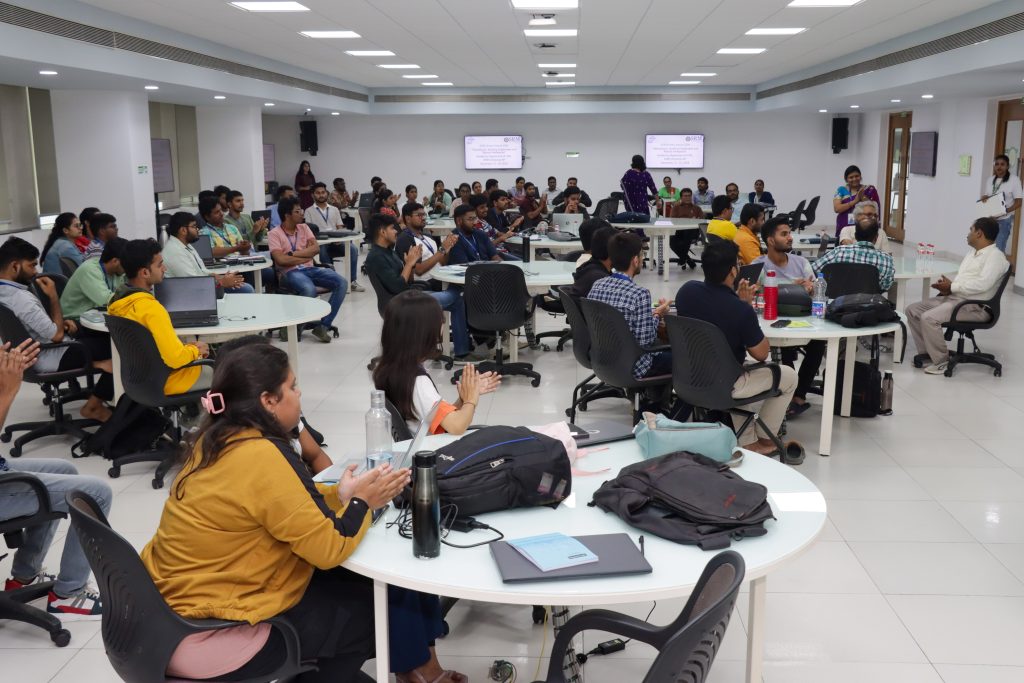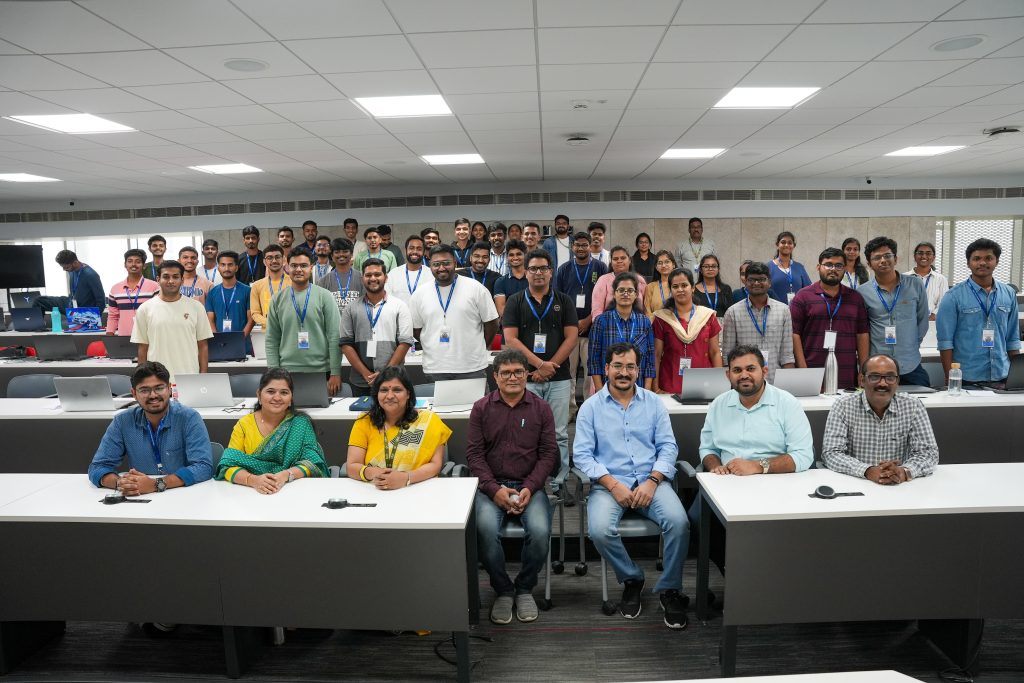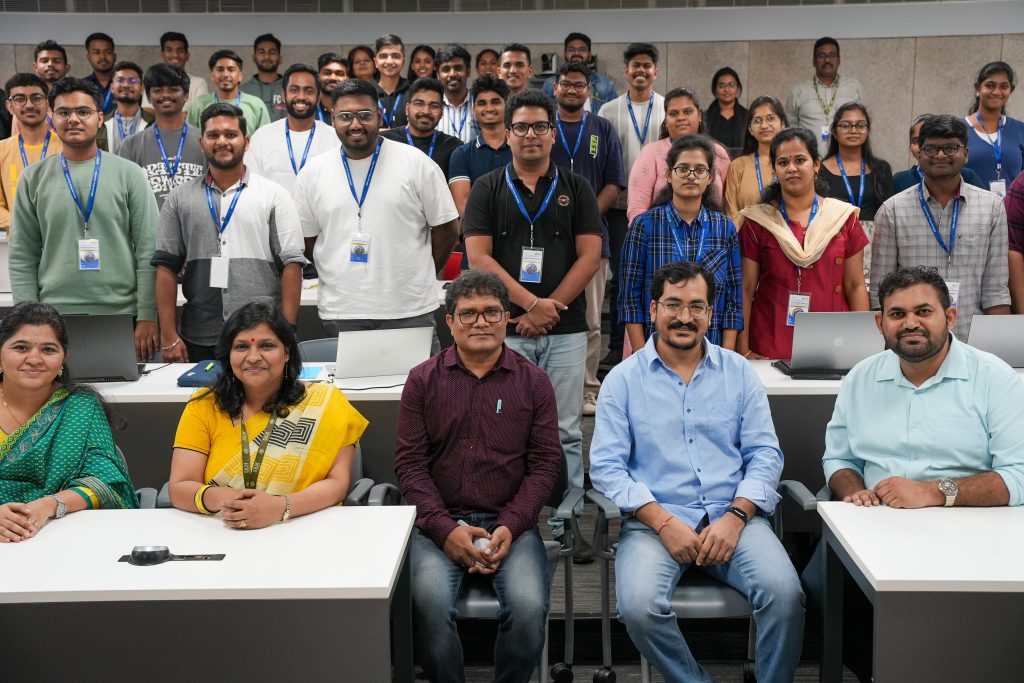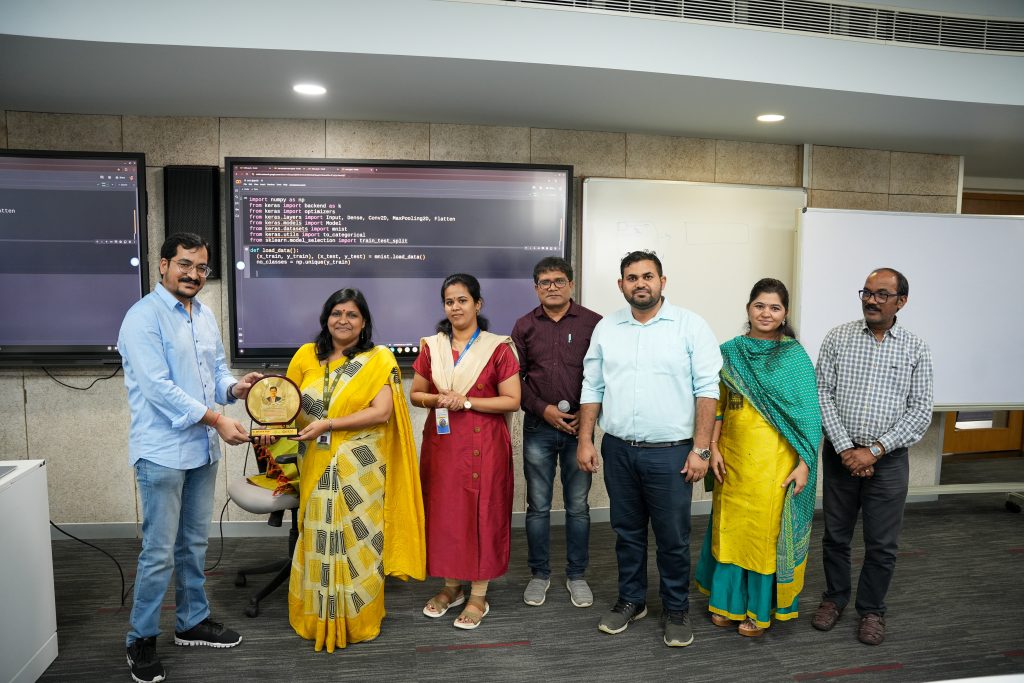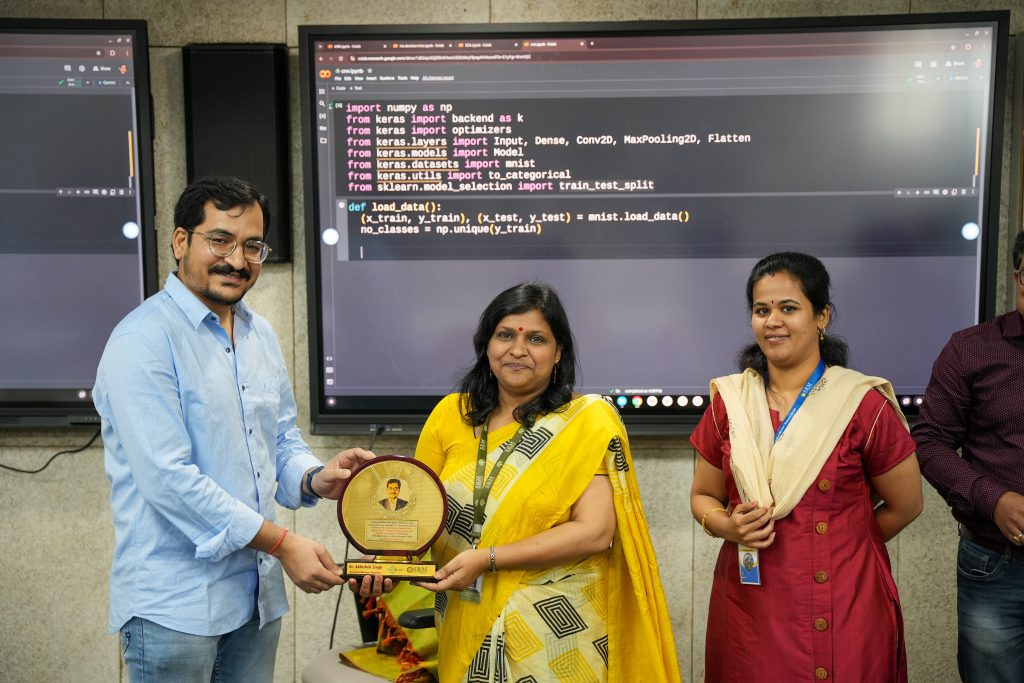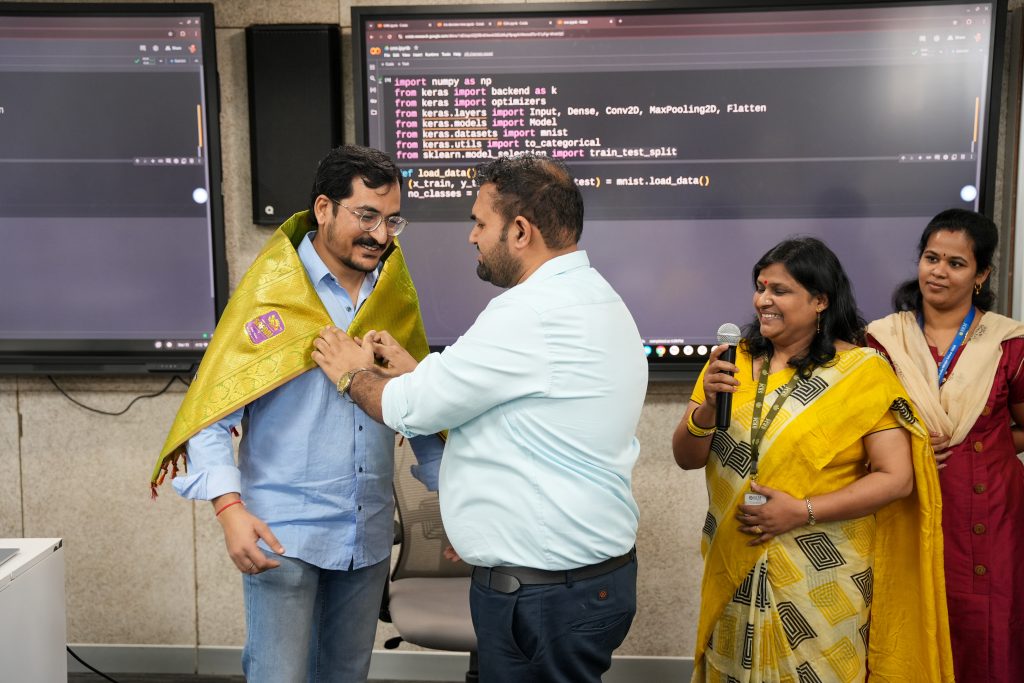Sai Likhita to Join ISRO as Scientist C
 Ms Vunnava Sai Likhita, an alumnus of SRM University-AP from the 2021 BTech Electrical and Electronics Engineering batch, has successfully secured four esteemed Central Government jobs. Hailing from Prakasham District in Andhra Pradesh, Likhita has diligently worked her way to secure four Central Government positions. Post her BTech in Electronics and Communications Engineering (ECE) from SRM University-AP, she undertook coaching for the ISRO entrance exams while simultaneously preparing for the GATE examination.
Ms Vunnava Sai Likhita, an alumnus of SRM University-AP from the 2021 BTech Electrical and Electronics Engineering batch, has successfully secured four esteemed Central Government jobs. Hailing from Prakasham District in Andhra Pradesh, Likhita has diligently worked her way to secure four Central Government positions. Post her BTech in Electronics and Communications Engineering (ECE) from SRM University-AP, she undertook coaching for the ISRO entrance exams while simultaneously preparing for the GATE examination.
In the 2024 GATE exam, Likhita achieved an impressive 268th rank, marking the beginning of her remarkable journey toward success.Post GATE, she tackled competitive exams for DRDO, Air Force, and BEL. Her hard work and determination bore fruit when she cleared the exams for all four positions, earning commendable ranks. However, Likhita chose to accept the offer from ISRO as Scientist C.
In the DRDO exam, Likhita secured the position of Junior Research Fellow (JRF), while in the Air Force exam, she was appointed as a Junior Executive. At BEL, she was selected as a Probationary Engineer, and in the Intelligence Bureau, she has secured the position of a Junior Intelligence Officer.
On this occasion, University Pro-Chancellor, Dr P Sathyanarayanan; Vice Chancellor Prof. Manoj K Arora, and the faculty members, Dr Sreenivasulu Tupakula, Dr V Sateeshkrishna Dhuli, and Dr K A Sunita congratulated their former student.
Reflecting on her journey, Likhita stated, “Becoming an ISRO Scientist has always been my ambition. Upon completing my BTech, while many opt for corporate careers, I remained steadfast in my goal to serve my country. Today, I am proud to say that my dream has come true. My uncle at DRDO has been a source of inspiration for me. The encouragement from my parents and professors at SRM AP has played a pivotal role in helping me achieve my aspirations, and I am grateful for their unwavering support.”
Lecture on Experimental Research Design by Prof. C Raghunath
 The Department of Management under the Paari School of Business organised an engaging interactive session with Faculty and PhD Scholars on Experimental Research Design. The session was addressed by Prof. Raghunath Singh Rao, Professor of Marketing at UT, University of Texas, Austin. The event provided an insightful discussion on Marketing Research where Prof. Raghunath Singh Rao shared personal insights on his research and experiments conducted in India since 2014.
The Department of Management under the Paari School of Business organised an engaging interactive session with Faculty and PhD Scholars on Experimental Research Design. The session was addressed by Prof. Raghunath Singh Rao, Professor of Marketing at UT, University of Texas, Austin. The event provided an insightful discussion on Marketing Research where Prof. Raghunath Singh Rao shared personal insights on his research and experiments conducted in India since 2014.
During the session, Prof. Rao discussed a specific experiment in the healthcare sector, highlighting the necessity of preventive healthcare in rural areas. He also presented findings from an experiment focused on the role of incentives for medical representatives and how these incentives influence their performance and sales strategies. His expertise on designing and implementing field experiments in India, offering practical insights and methodologies for conducting impactful research in the Indian context.
The outcome of the programme was two-fold. First, participants learned how to conduct in-field experiments addressing practical problems in India. Prof. Raghunath Singh Rao provided a framework for identifying relevant issues and designing experiments that can yield actionable insights. Second, attendees gained a comprehensive understanding of effectively conducting these experiments. Key points emphasised included the importance of clear objectives, selecting appropriate control and treatment groups, ensuring ethical considerations, and maintaining rigorous data collection and analysis methods. Prof. Rao also highlighted the need for adaptability in the field, considering local contexts and potential challenges. Additionally, the session covered how to conduct research through mathematical models, providing a robust approach to analysing complex data and deriving meaningful conclusions. This knowledge equips researchers with the tools to design and implement impactful field experiments, ultimately contributing to solving real-world problems in India
- Published in Departmental News, News, Paari Current Happenings
Patent on SQL Free Database Interaction
This research, by Dr Ashu Abdul, Assistant Professor and research scholar Ms Surya Samantha Beri along with forth-year student, Mr Jakkampudi Venkatasubbaiah from the Department of Computer Science and Engineering explores a framework designed to help users retrieve and analyse data without requiring any Structured Query Language (SQL) knowledge. The patent titled, “System and Method for Generating Structured Queries from Natural Language Inputs , with application no: 202441096460 is particularly relevant as it enables individuals, like a car dealer seeking sales insights, to interact with their databases using everyday language. Such accessibility underscores the importance of this research in democratising data access for all users.
Abstract:
This project is centred around creating a framework that translates user queries into SQL statements and retrieves results without requiring any SQL knowledge from the user. By delving into the workings of various RDBMS systems, with a special focus on MySQL, I developed a solid understanding of database architecture and how databases are engineered for optimized performance. This knowledge was critical in designing a system that can seamlessly interact with any given database, analyse it, and provide relevant results in response to user input.
About the Framework:
This framework is intended to convert the user queries into SQL statements and attain the results from the database without intervention of SQL coding. Every time writing multiple SQL commands to apply filters, commands, and extracting data is time-consuming and requires having knowledge of SQL knowledge. This project is intended to analyze a database and answer the questions that are related to a particular database without writing SQL commands.
Explanation in Layperson’s Terms:
In-General we rely on programmers who are efficient in programming SQL for finding the insights from the database which are related to business or information. So, Laymen cannot access data without knowing SQL this project makes it possible. Assume, Mr. A a car dealer owns a showroom has a software dealing with his Business he wants to access his data and get insights for understanding the sales. Now he is not familiar with using SQL so he relies on someone for that or opens software and applies multiple filters to analyze his data. But What if he can use a chatbot and get solutions for all his questions from his database?
Mr.A can get conclusions from his data within no-time that thought represents this entire project.
What are the use cases of this framework to a layman?
Laymen interaction with the database for understanding their data. Reducing the requirement to understand and search for the filters in the front-end. Faster data extraction from the database. Generating the results based on user queries in natural language without SQL coding. Elimination of time and efforts required for writing SQL Commands or applying filters. Understanding data gets easier for engineers as well as unknown data can be understood easily.
Practical Implementation:
This project has been successfully integrated into several existing real-time applications, enabling precise identification of data locations. By fine-tuning and enhancing our algorithms, we have achieved significant improvements in accuracy. In practical terms, users can effortlessly explore and comprehend their data.
Furthermore, extensive testing across databases of varying sizes has demonstrated the project’s ability to deliver significant and well-structured results.
Future Enhancements:
Incorporating Natural Language Processing (NLP) to process and respond to queries in users’ native languages, including speech-to-text capabilities.
Facilitating the generation of dynamic reports in various formats such as PDFs and Excel sheets.
Expanding compatibility to support additional database systems like Oracle, PostgreSQL, and NoSQL models.
Enabling data extraction and analysis from Excel sheets and CSV files.
- Published in CSE NEWS, Departmental News, News, Research News
ETOT 2024 : Advancing Optical Technology in India
The Department of Physics organised the International Conference on Emerging Trends in Optical Technology (ETOT 2024), showcasing the latest advancements in the field of Optical Technology. The conference featured esteemed chairpersons Prof. R P Singh and Prof. Achanta Venugopal, alongside distinguished dignitaries including Registrar, Dr R Premkumar, Dean-SEAS , Prof. C V Tomy, and Dean-Research, Prof. Ranjit Thapa.
In his inaugural address, Dr Gangi Reddy Salla, Associate Professor and programme convenor from the Department of Physics, emphasised the vital role of Optical Technology in contemporary society. He stated, “This conference serves as a crucial platform for discussing the emerging trends and innovations in Optical Technology, reflecting its significance in various sectors today.”
The conference hosted 62 distinguished speakers from India and abroad, receiving a total of 103 abstracts, with 40 contributions from the university across various departments. As an association with IOP Proceedings, special acknowledgment will be featured in its upcoming issue. Additionally, the conference was generously supported by sponsors exceeding 10 lakhs, including notable companies such as ANRF, ATOS, Advanced Photonics,AIMIL and CIPHR and the University of Tartu. OPTICA also endorsed this significant event.
During the proceedings, five exemplary paper awards were announced in honour of the conference chairperson Prof. R P Singh. In his welcome address, Prof. C V Tomy remarked, “Despite being only seven years old, the university has made significant strides in research, this conference is testimonial to the varsity’s research excellence and will not just pave way for advancements in the field of optical technology, but will also fosters collaboration between industry leaders and academic experts.”
Prof. Achanta Venugopal highlighted the pressing need for a uniform curriculum in Optics and Photonics nationwide. He expressed concern over the lack of fabrication laboratories to expand research possibilities, saying, “Conferences like these can significantly impact our field by addressing the necessity for such facilities, prompting governmental action to support our academic aspirations.”
Prof. R P Singh urged attendees to broaden their research applications beyond academic papers, particularly in fields such as Agriculture and Medicine. He stated, “The utilisation of optical technologies can revolutionise these sectors, and it is essential for our research to resonate with real-world challenges and reach those in need.”
The event concluded with the recognition of the chairpersons by Registrar Dr R Premkumar, Dean-SEAS, Prof. C V Tomy, and Dean-Research, Prof. Ranjit Thapa. The release of the abstract book marked another highlight of the conference, with Dr Ravi Kumar delivering the vote of thanks. The event also featured insightful presentations and discussions from prominent speakers representing renowned institutions both in India and internationally.
- Published in Conferences, Departmental News, News, Physics News
Patent on SQL Free Database Interaction
 This research paper, by Dr Ashu Abdul, Assistant Professor and research scholar Ms Surya Samantha Beri along with fourth-year student, Mr Jakkampudi Venkatasubbaiah from the Department of Computer Science and Engineering explore a framework designed to help users retrieve and analyse data without requiring any Structured Query Language (SQL) knowledge. The paper titled, “System and Method for Generating Structured Queries from Natural Language Inputs“, is particularly relevant as it enables individuals, like a car dealer seeking sales insights, to interact with their databases using everyday language. Such accessibility underscores the importance of this research in democratising data access for all users.
This research paper, by Dr Ashu Abdul, Assistant Professor and research scholar Ms Surya Samantha Beri along with fourth-year student, Mr Jakkampudi Venkatasubbaiah from the Department of Computer Science and Engineering explore a framework designed to help users retrieve and analyse data without requiring any Structured Query Language (SQL) knowledge. The paper titled, “System and Method for Generating Structured Queries from Natural Language Inputs“, is particularly relevant as it enables individuals, like a car dealer seeking sales insights, to interact with their databases using everyday language. Such accessibility underscores the importance of this research in democratising data access for all users.
Abstract:
This project is centred around creating a framework that translates user queries into SQL statements and retrieves results without requiring any SQL knowledge from the user. By delving into the workings of various RDBMS systems, with a special focus on MySQL, I developed a solid understanding of database architecture and how databases are engineered for optimized performance. This knowledge was critical in designing a system that can seamlessly interact with any given database, analyse it, and provide relevant results in response to user input.
About the Framework:
This framework is intended to convert the user queries into sql statements and attain the results from the database without intervention of sql coding. Every time writing multiple SQL commands to apply filters, commands, and extracting data is time-consuming and requires having knowledge of SQL knowledge. This project is intended to analyze a database and answer the questions that are related to a particular database without writing sql commands.
Explanation in Layperson’s Terms:
In-General we rely on programmers who are efficient in programming SQL for finding the insights from the database which are related to business or information. So, Laymen cannot access data without knowing SQL this project makes it possible. Assume, Mr. A a car dealer owns a showroom has a software dealing with his Business he wants to access his data and get insights for understanding the sales. Now he is not familiar with using SQL so he relies on someone for that or opens software and applies multiple filters to analyze his data. But What if he can use a chatbot and get solutions for all his questions from his database?
Mr.A can get conclusions from his data within no-time that thought represents this entire project.
What are the use cases of this framework to a layman?
Laymen interaction with the database for understanding their data. Reducing the requirement to understand and search for the filters in the front-end. Faster data extraction from the database. Generating the results based on user queries in natural language without sql coding. Elimination of time and efforts required for writing SQL Commands or applying filters. Understanding data gets easier for engineers as well as unknown data can be understood easily.
Practical Implementation:
This project has been successfully integrated into several existing real-time applications, enabling precise identification of data locations. By fine-tuning and enhancing our algorithms, we have achieved significant improvements in accuracy. In practical terms, users can effortlessly explore and comprehend their data.
Furthermore, extensive testing across databases of varying sizes has demonstrated the project’s ability to deliver significant and well-structured results.
Future Enhancements:
Incorporating Natural Language Processing (NLP) to process and respond to queries in users’ native languages, including speech-to-text capabilities.
Facilitating the generation of dynamic reports in various formats such as PDFs and Excel sheets.
Expanding compatibility to support additional database systems like Oracle, PostgreSQL, and NoSQL models.
Enabling data extraction and analysis from Excel sheets and CSV files.
- Published in CSE NEWS, Departmental News, News, Uncategorized
ACM Winter School 2024: A Platform for Innovation
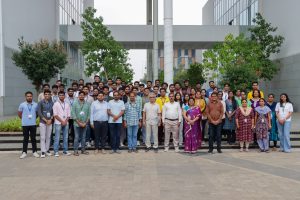 The ACM Winter School 2024, organised by the Department of Computer Science, was aimed to enhance advanced learning in the field of computing. This prestigious programme successfully attracted participants from across India, representing 22 eminent institutions, including notable names like IIT Delhi, IIT Gandhinagar, and IIT Hyderabad.
The ACM Winter School 2024, organised by the Department of Computer Science, was aimed to enhance advanced learning in the field of computing. This prestigious programme successfully attracted participants from across India, representing 22 eminent institutions, including notable names like IIT Delhi, IIT Gandhinagar, and IIT Hyderabad.
The inaugural session, was graced by distinguished academic figures such as Prof. Nibaran Das from Jadavpur University and Prof. C V Tomy, the Dean of the School of Engineering and Sciences. The faculty coordinators, Dr Priyanka Singh, Dr Ajay B, Dr Ravi Kant Kumar, and Dr Niladri Sett, played significant roles in facilitating the event.
During the opening remarks, Dr Ajay B, who serves as an Assistant Professor and faculty coordinator, emphasised the importance of creating platforms that inspire innovative thinking and empower students with fresh, out-of-the-box ideas. His perspective resonated with the overarching goals of the Winter School to cultivate cre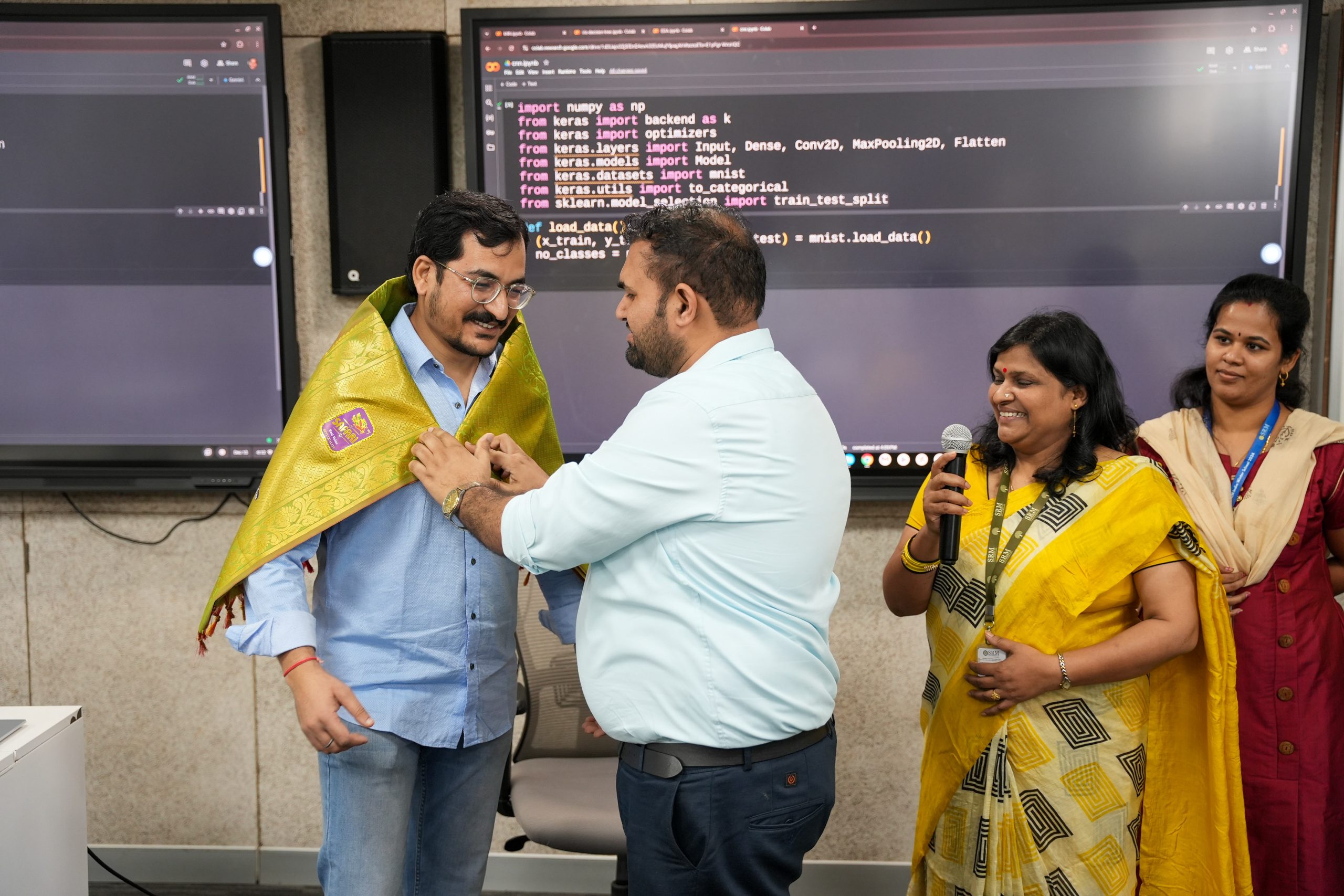 ativity and collaboration among the participants.
ativity and collaboration among the participants.
Dr Priyanka Singh provided a comprehensive overview of the programme’s objectives, setting the tone for the enriching experiences that lay ahead. Following her, Prof. C V Tomy addressed the audience, underscoring the significance of such events in offering new insights and facilitating networking opportunities. He praised the organising team for their commitment to making this initiative a reality and highlighted its potential impact on the academic journeys of the participants.
With a dynamic lineup of sessions led by experts from various parts of the country, the ACM Winter School delivered a transformative learning experience. This gathering promotes collaboration and knowledge exchange, aiming to foster a deep understanding of critical computing topics among attendees.
Adding to the programme’s rich content, Dr Abhishek Singh was recognised as the esteemed resource person for the Winter School. His extensive expertise and invaluable insights have significantly enriched the experience, inspiring participants to engage in innovative thought. The gratitude expressed by the faculty coordinators—Dr Priyanka Singh, Dr Ajay B, and Dr Ravi Kant Kumar—reflects the lasting impact his contributions have made on all attendees.
The ACM Winter School 2024 promises to be a milestone event, equipping participants with knowledge and skills that will undoubtedly resonate in their academic and professional pursuits.
- Published in CSE NEWS, Departmental News, News
Enhancing Teaching Practices with Prof. Conrad
 The Teaching Learning Centre successfully conducted a two-day workshop on Project-Based Learning (PBL). The workshop, designed to equip educators with innovative teaching methodologies, brought together 64 faculty members from various disciplines to explore the transformative potential of PBL in higher education.
The Teaching Learning Centre successfully conducted a two-day workshop on Project-Based Learning (PBL). The workshop, designed to equip educators with innovative teaching methodologies, brought together 64 faculty members from various disciplines to explore the transformative potential of PBL in higher education.
The workshop was led by Prof. James M. Conrad, a distinguished academic from the University of North Carolina at Charlotte, USA Prof. Conrad, who serves as the Associate Chair of Undergraduate Programs in the Department of Electrical and Computer Engineering, shared his extensive expertise in Computer Engineering, Embedded Systems, and Robotics. His sessions provided a comprehensive understanding of how PBL can foster critical thinking, collaboration, and real-world problem-solving skills among students.
The event began with an introduction to the core principles of PBL, emphasising its alignment with curriculum objectives and its role in creating meaningful, student-centered learning experiences. Participants engaged in interactive sessions that included hands-on activities and group discussions. These activities were designed to help faculty design effective PBL frameworks, manage group dynamics, and assess student progress through formative and summative evaluation methods.
A key highlight of the workshop was the integration of technology and collaborative tools into the PBL process. Faculty members explored various platforms that enhance student engagement and project outcomes, making PBL adaptable to diverse academic disciplines. Practical exercises provided participants with actionable strategies to implement PBL in their classrooms.
By the end of the workshop, participants expressed their enthusiasm and confidence in adopting PBL methodologies. The faculty gained valuable insights into fostering an interactive and innovative learning environment that prepares students for real-world challenges. The workshop was widely appreciated for its practical approach and the relevance of its content to modern educational needs.
- Published in News, Teaching Learning Centre, TLC
Christmas Festivities on Campus
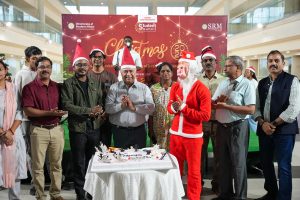 The spirit of Christmas illuminated the campus as students, faculty, and staff gathered to celebrate the festive season with joy and camaraderie. This year’s Christmas celebration, jointly organised by the Directorate of Student Affairs and the Directorate of Human Resource Development, was a spectacular event that showcased the true essence of the unity in diversity.
The spirit of Christmas illuminated the campus as students, faculty, and staff gathered to celebrate the festive season with joy and camaraderie. This year’s Christmas celebration, jointly organised by the Directorate of Student Affairs and the Directorate of Human Resource Development, was a spectacular event that showcased the true essence of the unity in diversity.
The celebration witnessed enthusiastic participation from the university’s leadership, including the Vice Chancellor, Registrar, Deans of schools, faculty and staff members. Their presence added warmth and inspiration to the festive occasion.
The event was particularly memorable due to the vibrant involvement of international students, the games, performances, and other activities highlighting the inclusive spirit of the university. Faculty, Students and staff showcased their talents and earned accolades in various competitions, reflecting the dynamic and collaborative atmosphere on campus.
The Vice Chancellor inaugurated the event with an uplifting speech that resonated with the festive cheer, setting the stage for a day filled with joy and celebration. A series of engaging games and activities, meticulously planned by the organising directorates, ensured that every participant had a chance to revel in the festive spirit.
- Published in News, Students Achievements
TLC Facilitates Workshop for PhD Scholars
 The Teaching Learning Centre conducted a one-day workshop on innovative teaching methods, designed exclusively for PhD Scholars. The event saw the participation of 40 scholars from various departments who sought to enhance their teaching and research capabilities through advanced pedagogical techniques.
The Teaching Learning Centre conducted a one-day workshop on innovative teaching methods, designed exclusively for PhD Scholars. The event saw the participation of 40 scholars from various departments who sought to enhance their teaching and research capabilities through advanced pedagogical techniques.
The workshop was led by Prof. James M Conrad, a renowned academic and expert in embedded systems, robotics, and modern teaching methodologies. With his extensive academic experience and leadership roles, including contributions to IEEE, Prof. Conrad brought a global perspective to the session. He guided the participants through strategies to foster student engagement, manage diverse learning needs, and incorporate innovative approaches into classroom and laboratory settings.
The workshop focused on equipping scholars with practical skills to create engaging and inclusive learning environments. Participants explored the use of digital platforms and modern educational technologies to enhance teaching effectiveness and improve student outcomes. Interactive discussions and hands-on activities encouraged scholars to exchange ideas, collaborate, and develop tailored teaching strategies that meet the needs of diverse learners.
By the end of the session, the scholars gained confidence in applying innovative, student-centered methodologies. They felt empowered to contribute significantly to the quality of education and learning outcomes at their respective institutions. This training not only prepared them for their roles as Teaching Assistants (TAs) but also equipped them with the tools to excel as future educators and researchers.
The workshop exemplifies SRM AP’s commitment to fostering excellence in education through innovative training programmes. It highlighted the university’s dedication to preparing scholars for the evolving challenges of academia, ensuring they are equipped to create impactful learning experiences.





- Published in News, Teaching Learning Centre, TLC
Dr Gavaskar Publishes Patent on Generating Prompts
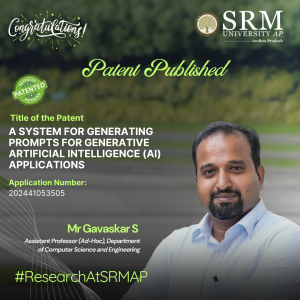
The Department of Computer Science and Engineering is proud to announce that Dr S Gavaskar has published his patent titled A System for Generating Prompts for Generative Artificial Intelligence (AI) Applications (Application Number: 202441091788). This groundbreaking invention will prove to be a significant advancement in the field of AI, enabling the creation of contextually rich and user-specific prompts, thereby enhancing the accuracy and usability of generative AI systems across various domains.
A Brief Abstract:
This research invention relates to Prompt creation process for Generative AI Application by introducing Four way corpus directory(FWCD) comprising the Persona corpus, Localized Application Specific Content Corpus, Annotator corpus, and Stopword corpus to create well-formed, contextual prompts for AI models. It also employs Semantic Based Categorization and Ranking(SBCR) for semantically categorizing and ranking the content present in the Localized Application Specific Content Corpus . The invention improves the interaction between users and Generative AI. It helps deliver more accurate, semantic based outputs from the AI models, improving the overall performance and usability of the system.
Explanation in Layperson’s Terms:
Prompt engineering is the process of using natural language to create instructions that generative artificial intelligence (AI) models can understand and interpret.In this research we have create a system for prompt creation by which the users can create their own prompt with the combination of their persona details,stopword,annotator content from their localized corpus directory before applying to the LLM models such as ChatGPT,Copilot etc.
Practical Implementation / Social Implications:
- This concept can be implemented in Education Institutions to generate tailored prompts for learning materials and academic projects.Enterprises can use localized content to generate role-specific prompts. and marketing organizations can use to create prompts aligned with specific campaigns or audience demographics.It can also be used in organizations where multiple persons with different roles and responsibilities are there and they have their own localized content for which a prompt has to be created for an Generative AI Application.
This invention also lets people from different skill levels access the system and create their own prompt for their applications.
Future Research Plans:
Future research focus is on creating LLM and AI related applications to the field related to education.cyber security,Legal and Enterprises.
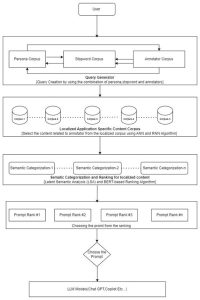
- Published in CSE NEWS, Departmental News, News, Research News







